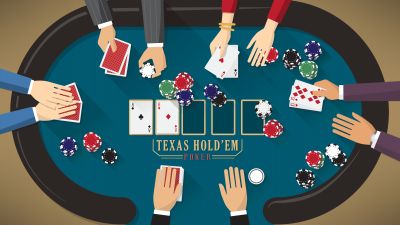
Many of my readers are fascinated by poker tournaments. They watch the major ones on television, they are impressed by the amount of money that go to the winners, and they think, 'HMMM....If only I could get involved in one of those things, I might come out a winner.'

Other players are intimidated by the tournaments. One friend who plays a pretty good game of poker confessed to me, 'I don't play tournaments because I don't understand how they work.' She prefers her regular cash games. This is fine, but her reasoning is wrong.
Tournaments are relatively easy to play. You can parlay a small amount of money, the buy-in, into a lot of collective cash if you understand basic strategy. Here are a few pointers that have helped me win or finish in the money in more than 100 poker tournaments over the years.
The most important advice I can offer you is this: Don't try to win the tournament in the first hour. Don't even try to win it in the second hour. You cannot win a poker tournament early, but you can sure lose it.
Let's say you decide to put up your $50 or so for the buy-in. In return for your money, you receive say $2,000 in tournament chips. Unless you are in a tournament that provides for a re-buy, those are all the chips you will receive. When they are gone, bye-bye. You are out of the tournament.
Nearly all poker tournaments are no-limit events. That means players can go all-in at any stage of the tournament. This requires you to make snap judgments on hands like pocket jacks, ace-queen, king-queen or pocket 10s. Do you call and possibly face pocket aces or kings, or do you fold and wait for a better opportunity?
In the early stages of a tournament, you should be willing to gamble, hoping to get a miracle flop that will enable you to catch a 'nut' hand. This requires you to have position in order to be most effective.
I like to play suited connectors or even a hand like nine-eight offsuit if I am in position. Being in position means you are last or next to last to act. I will play almost any two cards early in a tournament, for example, if I am behind the button or one position from the button -- especially if I am seated to the right of a non-aggressive player.
I remember being in a tournament not long ago when the dealer dealt me a six-five of spades. Nearly all the other players called the bet and I was behind the button. I called and the flop came seven-four-three. Someone came out betting, there were three callers, and then it was up to me.
I called the bet.
Fourth street was an ace. There were no flush draws on the board. The betting continued and the player in seat six raised. I had the nut hand, a straight, and again I just called. The river card was a king. When the betting commenced, I put in the raise and collected a big payoff.

I ended up making the final table, by the way, and had a good pay day.
Poker players who watch the big tournaments on television are impressed when they see somebody go all-in on a relatively poor hand. They feel this is proper strategy and try to imitate it. My advice to you is don't.
The only time you want to go all in is after you have made the final table. You are in the money. Your strategy has paid off. That is when the real gambling begins. The rest is simply foreplay.
Tournaments can be heart-breakers. The blinds increase every 15 or 20 minutes depending on the structure. When the blinds get big and you are short on chips, you will have to make a decision on those border-line hands.
Nobody can give you perfect advice on what to do when you are near the 'bubble', which means you either make the final table or get knocked out by a better hand. I have made some serious mistakes either going all in with my ace-ten or king-nine only to be called by somebody who outdraws me. This will happen. It's gambling. It's poker.
One of my good friends is a Native American who calls herself Crying Wind. She is a published book author. She grew up on an Indian reservation, had a troubled childhood, and developed into one of the better writers of her generation.
I interviewed her for a newspaper profile article once and before leaving the office, she gave me a copy of her autobiography. She autographed it and added, 'To Geno -- when he lets the tiger out of the cage, world, look out!'
Keep your tiger in the cage until it's time to be released. Then do it. Let the games begin.
Author: Geno Lawrenzi Jr.
(Geno Lawrenzi Jr. is an international journalist, magazine author and ghostwriter and poker player who lives in Phoenx, AZ. He has published 2,000 articles in 50 magazines and 125 newspapers. If you want to share a gambling story or book idea with him, send an email to glawrenzi@gmail.com ).
Your feedback
Please enter your comment.
Your comment is added.
Comments (1)
OOPaloo
![]() 12/11/15, 09:12:06 PM
12/11/15, 09:12:06 PM
I agree with almost everything you say in this article. I think that tight and careful play can get you far in a tournament. I have only played online tournaments,...
I agree with almost everything you say in this article. I think that tight and careful play can get you far in a tournament. I have only played online tournaments, but I disagree about going all in before the final table. The final table is quite late in a tournament, but it is of course where most of the money to be won is to be found. But to build your stack during the tournament if you have a really powerful two cards like AA or AK suited or KK or QQ then you can harvest needed chips to take you forward by going all in earlier than the final table. It will depend on the situation. Have you ever noticed that some players are more suited to tournament play than cash table play? Do you have any ideas about why it works that way sometimes?
Show more



